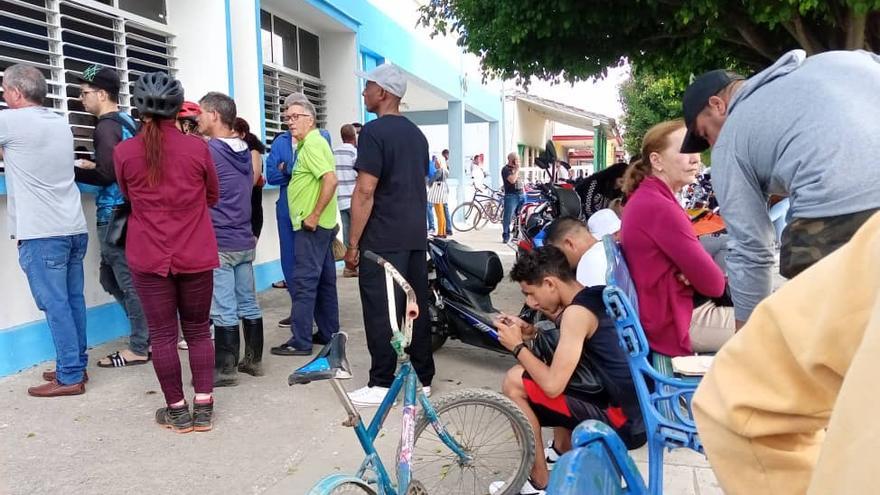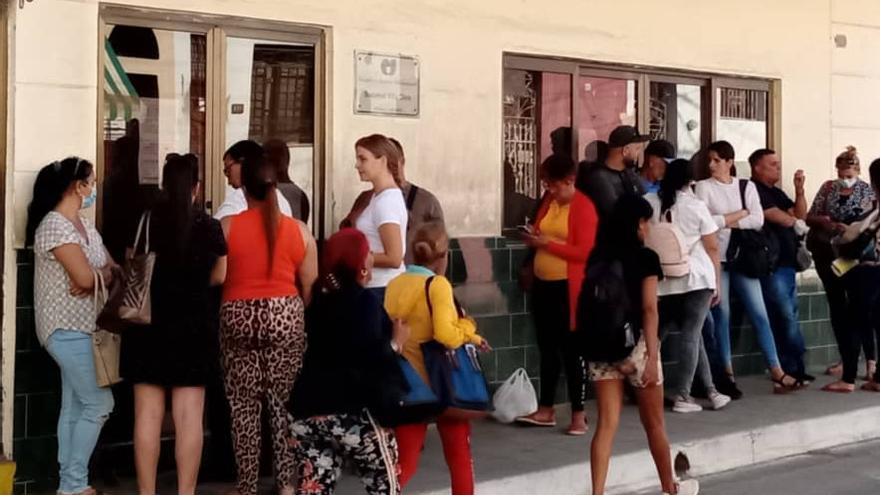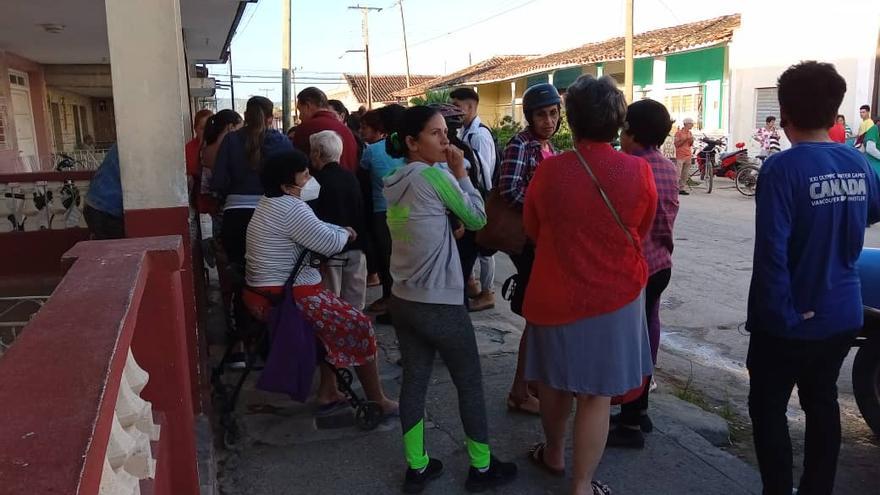
![]() 14ymedio, Yankiel Gutiérrez Faife, Camajuaní, 17 April 2023 — At the doors of the Camajuaní Collective Law Firm, located on Agramonte Street, between Maceo and General Naya, Janet, an elementary school teacher in Santa Clara, has just been given the run around after four months of waiting. “Yesterday was the last day we could get our documents stamped as legal. No more will be done until further notice,” one of the institution’s lawyers informed her.
14ymedio, Yankiel Gutiérrez Faife, Camajuaní, 17 April 2023 — At the doors of the Camajuaní Collective Law Firm, located on Agramonte Street, between Maceo and General Naya, Janet, an elementary school teacher in Santa Clara, has just been given the run around after four months of waiting. “Yesterday was the last day we could get our documents stamped as legal. No more will be done until further notice,” one of the institution’s lawyers informed her.
After almost half a year of struggle with the institutions, Janet had managed to correct the errors in a document where her parents’ name was misspelled, and she was able to obtain three birth registrations and a marriage certificate. Having overcome the exhaustion of acquiring those papers, the law firm’s refusal portends more waiting in line.
Processing and legalizing documents is one of the most overwhelming processes faced by Cubans. After a “way of the cross” of bribes, going back and forth and long lines, nothing guarantees that a birth registration or a university degree will be ready in time to take a trip or enroll in a foreign university. From the purchase of a stamp to the signature of an official, there is only one constant: the desperation to get out of the bureaucratic labyrinth.

The situation is well known in the Ministry of Foreign Affairs, the institution that usually puts the decisive stamp on a document for it to be valid beyond Cuban borders. Unperturbed, the director of Consular Affairs, Ernesto Soberón, admitted the slowdown of all procedures and insisted that his office was taking “the necessary measures to respond to the increase in demand for service.” But, in reality, he didn’t promise anything.
The helplessness of Cubans lining up in front of law firms, civil registries and consultancies is the real drama. Aware — some more than others — of how bogged down the process has become, they look for alternatives and perfect several “tricks” to lighten the wait. But not everyone has the resources or the ability to overcome obstacles with good luck.
“In Santa Clara,” explains the lawyer of the Camajuaní Collective Law Firm, “there are also thousands of documents on the waiting list to be sent to the Foreign Ministry. Until we overcome this delay, we will not restart the service,” she affirmed. However, another of the lawyers had a recommendation: “Go early with your identity card to the Legal Consultancy of Santa Clara. Very early,” she insisted, “because turns in line are very limited, and if you don’t have an appointment before April 3, the doors will be closed until May.”
At five in the morning, Janet left her house, managed to catch a ride and went to the office on downtown Colón Street in Santa Clara. Her hopes were dashed as soon as it got light, when she saw that the line was already around the block, most people waiting to legalize documents. The lawyers started working at eight and, fortunately, Janet managed to get a turn.
“When I manage to deliver the papers and sign the contract to legalize my documents, I will feel relieved,” she says, knowing that she has only taken the first of many steps. “We have to live day by day so we don’t end up crazy.”
Once the document is deposited in the consultancy, the mechanism is put back in motion. The papers of the lucky ones who have signed their contracts will begin a rugged trip to Havana and, if everything is in order, the documents will be returned to the provinces months later. Even after suffering this delay, those who get their documents feel that the wait has had results.
Everything is very different when the lawyers themselves fail to comply with the clauses of the legalization contract, which theoretically obliges them not to delay the response to clients for more than 45 days. The actual waiting period, which reaches six months — often the documents have already expired after the wait — far exceeds what is stipulated.
A few weeks ago, the director of the Legal Consultancy went to the line herself and announced that it would no longer be possible to make an appointment in person. “At the end of April we will make the Ticket application available to users for all reservations,” she announced.
Several of the customers in line confronted the official with a barrage of additional questions: “Why don’t the collective law firms of the municipalities receive and legalize the documents? How can they change the process without official notice? Why do they want to concentrate all the work here if they don’t have the necessary conditions?”
As if it were an article of faith, the director of the Consultancy referred to Soberón’s announcement, which “suggested” that the rules of the game had changed due to the increase, by 16%, in the demand for procedures in the Embassy compared to 2022. “It’s not in our hands,” was the justification. “We don’t move the documents; we only contract for the services.”
The department headed by Soberón allegedly accepts about 1,000 documents a day, out of some 3,000 that they receive on average. The number of pending papers is overwhelming, explains one of the Consultancy workers, and the slow pace is aggravated because, in reality, the Ministry of Foreign Affairs continues to accept the same number as before, despite the official statements.
“Sometimes what takes the most time is the transfer of documents from the provinces to Havana, more difficult now due to the fuel crisis,” explains Fredy, a self-employed man from Santa Clara. “Customers themselves have recommended looking for ways to speed up the process, to ’decentralize’ to the eastern and central areas of the Island.”
The most viable solution so far is the one that seems least practical: traveling to Havana. Both Janet and Fredy have received the advice to rent a car and register on the waiting list of International Consultants and Lawyers, the International Legal Consulting or at Claim, a company dedicated to the protection of intellectual property that also legalizes procedures. You can also go to a Collective Law Firm in the capital or to Transconsul.

That’s what Claudia, a 24-year-old from Villa Clara, did, who was told to take her documents for legalization to the Embassy of Spain in Havana. “I sent them for legalization in January, and I’m still waiting. In order not to miss the appointment at the Embassy, I had to request proof of my parents’ marriage, get an appointment through a friend of my uncle’s and go to Havana to legalize the documents with Transconsul. It was a little faster there, 50 days or so,” she calculates.
In addition to the travel costs — in most of these institutions you have to go in person — each center has its own rules and peculiarities. Even in Havana there are long lines, the applications don’t work well and the phones are always busy.
“In reality, the law firms there are at the level of those in the province,” denounces Amelia, skeptical of the “technique” of traveling to the capital. “I had to get my daughter’s birth certificate. Every week I send my uncle who lives in the capital to ask about the procedure. They tell him that they will call when it’s ready and that he has to wait.”
One of the most frequent exits is the illegal way. Dubiel, a 23-year-old man from Santa Clara, who tried several times to solve his problem with an appointment at Claim, hired a “turn seller.” The price was 5,000 pesos [$208], to which was added the payment of the car trip, about 22,000 additional pesos [$917].
“My family in the United States sent me dollars. I sold them on the street, and that’s how I was able to pay for the trip. I was in a hurry and couldn’t afford to spend time with the law firms in Villa Clara,” he explains. The contact for the person who “facilitated” the appointment was found in a Facebook group.
Others offer, in private mail, the legalization of the document within 30 days, provided that 50 euros are paid for each procedure, in addition to a stamp of 500 pesos [$21]. “Apparently, it’s a business with the foreign officials themselves,” says Dubiel.
It is expected that digital processing, through state applications, will contribute to eliminating the “cluttering” of documents, but in reality it has complicated the picture. “Due to the lack of stamps, the customer can pay the tax on the document in cash or through an e-commerce platform. If the physical stamp is brought, we will send it along with the document. Otherwise, the amount can be paid digitally. There is no problem,” says another of the lawyers of the Santa Clara Consultancy.
With so many obstacles and in the face of a migratory exodus that has not ceased for months, the discomfort is growing. “After so much exhaustion standing in line at the civil registries, there are people who have documents from December and January that the lawyers won’t even look at. That’s why they have to pay, and it’s not cheap at all; it’s disrespectful,” says Maribel, a housewife from Santa Clara who is determined to get Spanish citizenship through the Law of Democratic Memory.
“If they really wanted to end this situation, they would open new branches for legalization services in the provinces,” she says, rejecting Soberón’s claims. “It’s no secret to anyone that people are now desperate.”
Translated by Regina Anavy
____________
COLLABORATE WITH OUR WORK: The 14ymedio team is committed to practicing serious journalism that reflects Cuba’s reality in all its depth. Thank you for joining us on this long journey. We invite you to continue supporting us by becoming a member of 14ymedio now. Together we can continue transforming journalism in Cuba.
